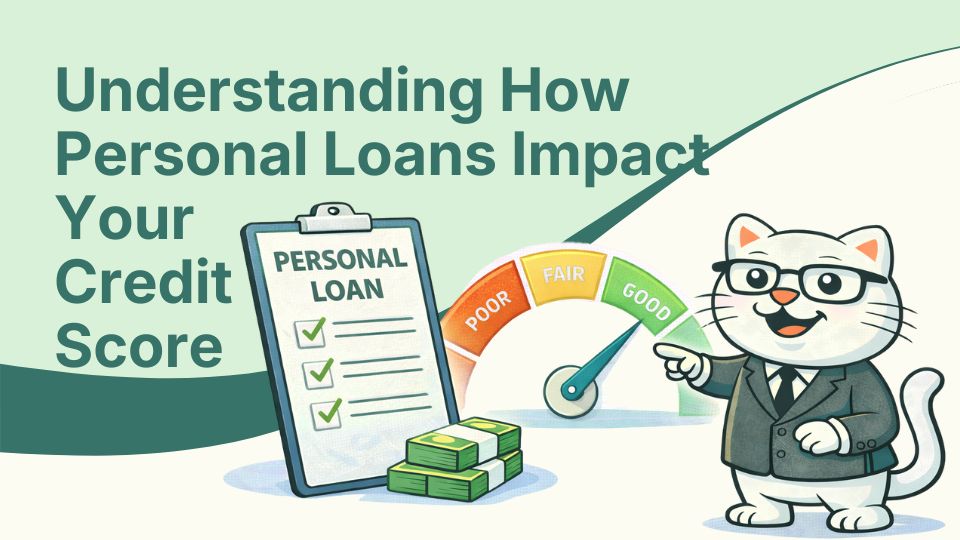Understanding How Personal Loans Impact Your Credit Score
March 01, 2022
Understanding How Personal Loans Impact Your Credit Score
Updated January 2026
Many South Africans turn to personal loans to manage emergencies, pay off debts, or fund important life goals. But one big question always comes up: Do personal loans affect my credit score?
The answer is yes — personal loans can both help and hurt your credit score depending on how you handle them. A new loan might cause a short-term dip due to a credit check, but regular, on-time repayments can improve your credit profile over time.
Let’s explore how personal loans work in South Africa, how they influence your credit score, and how to use them responsibly to strengthen your financial future.
Want to build your credit score faster?
This guide explains how personal loans can affect your credit score. If you want to compare regulated loan options safely, your next step is:
- Compare loan options: Compare Loans South Africa
- Free tools & guides: Free Credit Report
What Are Personal Loans and Why They Matter in South Africa
A personal loan is a lump-sum amount borrowed from a registered lender — such as a bank, credit union, or micro-finance provider — that you repay in fixed monthly instalments with interest.
In South Africa, personal loans are often used for:
-
Consolidating high-interest debt
-
Covering medical expenses or car repairs
-
Funding home improvements
-
Paying for education, weddings, or unexpected emergencies
Because personal loans are typically unsecured, approval depends heavily on your credit score, income, and affordability assessment in line with National Credit Regulator (NCR) guidelines.
If your goal is to compare personal loan offers specifically, you can explore options on our personal loans comparison page.
How Credit Checks Work When You Apply for a Personal Loan
When you apply for personal loans, the lender performs a hard credit check through credit bureaus such as Experian South Africa, TransUnion, or Compuscan.
A hard check allows lenders to assess your repayment history, outstanding debts, and credit risk. Each inquiry can cause a small, temporary dip in your score — usually a few points that recover within a few months.
💡 Tip:
Avoid submitting multiple loan applications within a short period. Too many credit enquiries can reduce your score temporarily and may lower your approval odds. If you’re still exploring options, it’s smarter to compare loan types and requirements before you apply.
Can Personal Loans Improve Your Credit Score?
Yes — when managed correctly, personal loans can strengthen your credit score over time. Here’s how they help:
1. Building a Positive Payment History
Your repayment history contributes most to your credit score. By consistently paying your personal loan on time, you show lenders you can handle debt responsibly — boosting your score gradually.
2. Improving Your Credit Mix
Lenders like to see a variety of credit types. Managing both revolving credit (like credit cards) and installment credit (personal loans) shows financial balance and maturity, which helps your score over time.
3. Lowering Credit Utilisation Through Debt Consolidation
Using personal loans to consolidate high-interest debts can lower your overall credit utilisation ratio. Paying off expensive credit cards with a structured, fixed-term loan simplifies payments and reduces financial stress.
How Personal Loans Might Hurt Your Credit Score
Just as personal loans can improve your score, mismanaging them can also cause harm. Here’s how:
1. Multiple Hard Credit Enquiries
Each loan application triggers a hard check. Several inquiries in a short period can reduce your score and make lenders see you as higher risk.
2. Taking On Too Much Debt
Every personal loan increases your total debt load. Borrowing more than you can afford can raise your debt-to-income ratio and lead to difficulty keeping up with repayments.
3. Missed or Late Payments
Missing a single personal loan payment can negatively impact your credit score. Creditors report missed payments to bureaus, and repeated late payments can lead to defaults that stay on your report for years.
4. Loan Defaults and Collections
If you fail to repay a personal loan, the lender may hand your account to collections. This can significantly harm your credit rating and limit your ability to borrow in the future.
What Credit Score Is Needed for Personal Loans in South Africa?
South African credit scores generally range between 300 and 850, though exact scales can differ slightly by bureau:
| Score Range | Rating | Loan Access |
|---|---|---|
| 741 – 850 | Excellent | Easy approval, best interest rates |
| 713 – 740 | Good | Likely approval with fair rates |
| 660 – 712 | Fair | Possible approval, higher interest |
| 575 – 659 | Below Average | Limited access, higher costs |
| 300 – 574 | Poor | May require secured or smaller loans |
If your score is below average, don’t panic. Some lenders specialise in personal loans for low-credit borrowers, though rates will be higher. You can still use these responsibly to rebuild your credit by paying on time.
Check your credit status regularly through Experian SA or TransUnion SA to ensure your report is accurate before applying.
Do Debt Consolidation Personal Loans Affect Credit?
Yes — and mostly in a positive way when used properly. Using personal loans to consolidate other debts can simplify your finances and reduce your credit utilisation ratio.
By replacing multiple high-interest debts with one manageable repayment, you improve payment consistency — one of the key drivers of a healthy credit score.
However, there’s a short-term credit dip when you first apply. Keep making payments on time and avoid taking on new debt to see improvement over several months.
How to Use Personal Loans Responsibly
To ensure personal loans work for you — not against you — follow these simple habits:
-
Borrow what you can afford – Avoid over-borrowing and stay within your monthly budget.
-
Set up debit orders – Automating repayments helps prevent missed instalments.
-
Monitor your credit score – Use tools from Experian or TransUnion to track progress.
-
Avoid applying for multiple loans – Focus on one loan at a time.
-
Read your loan agreement carefully – Understand your interest rate, fees, and penalties.
-
Plan for early repayment – If possible, paying off your loan early can reduce total interest and build trust with lenders.
How Long Do Personal Loans Stay on Your Credit Record?
In South Africa, personal loans remain visible on your credit record for up to five years after closure. If you pay on time, that positive record helps improve your future creditworthiness.
Defaults, however, stay visible for the same period and can limit access to affordable credit. That’s why managing your personal loan carefully is crucial.
Frequently Asked Questions About Personal Loans and Credit
Can I get personal loans with bad credit?
Yes, but you may need to work with alternative lenders and accept higher interest rates. Responsible repayment can help you rebuild your score.
Does settling a personal loan early help my credit?
It can. Early settlement reduces debt load and interest payments, showing strong financial control.
Are all lenders required to report personal loans to credit bureaus?
Most NCR-registered lenders report to major bureaus like TransUnion SA and Experian SA, ensuring your loan performance affects your credit file.
Key Takeaways: How Personal Loans Affect Credit in South Africa
-
Applying for personal loans causes a short-term dip due to hard checks.
-
Paying on time builds a strong repayment history and boosts your credit score.
-
Debt consolidation with personal loans can simplify repayments and lower credit utilisation.
-
Missed or late payments can seriously harm your score.
-
Responsible borrowing under NCR guidelines improves long-term credit health.
Final Thoughts
Personal loans can be a stepping stone to better credit — or a setback if not managed wisely. The difference lies in understanding how they affect your financial profile and making informed decisions.
At FatCat Loans, we’re committed to helping South Africans borrow smarter. Whether you need to consolidate debt, cover an emergency, or plan a big expense, we connect you with trusted, NCR-registered lenders that offer fair, transparent loan options.
Compare loan options safely (without damaging your credit)
Personal loans can be helpful when used responsibly — but your credit score improves fastest when you apply only when you’re ready and can afford the repayments.
If you want to compare loan types based on your needs and repayment ability, start here:
- Compare loans: Compare Loans South Africa
- Understand affordability first: Loan Repayment Calculator
Reviewed by the FatCat Loans Editorial Team. Read our publishing standards here: Editorial Policy.

The FatCat Loans Editorial Team delivers clear, accurate, and unbiased guidance on loans, credit, and personal finance in South Africa, in compliance with the National Credit Act. Our writers follow strict editorial standards to ensure every article is trustworthy, well-researched, and easy to understand, helping readers make confident financial decisions.




